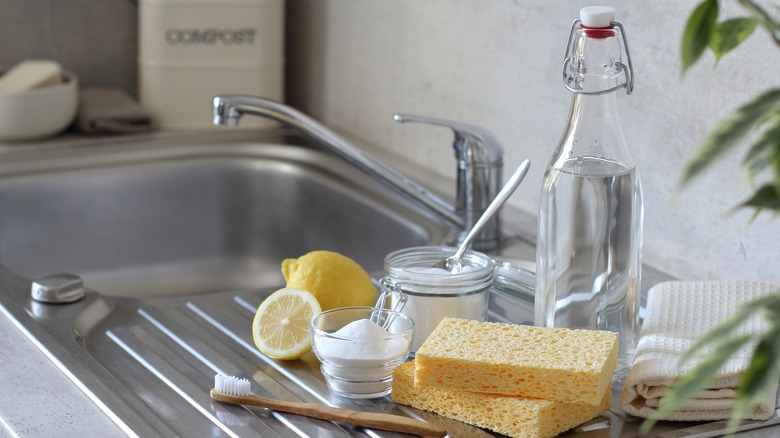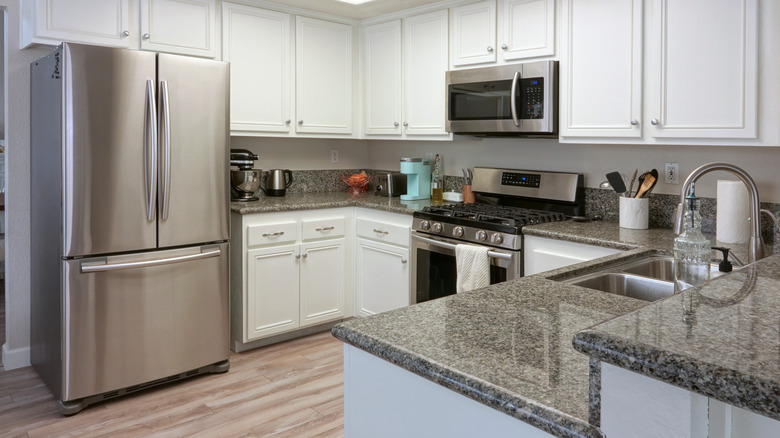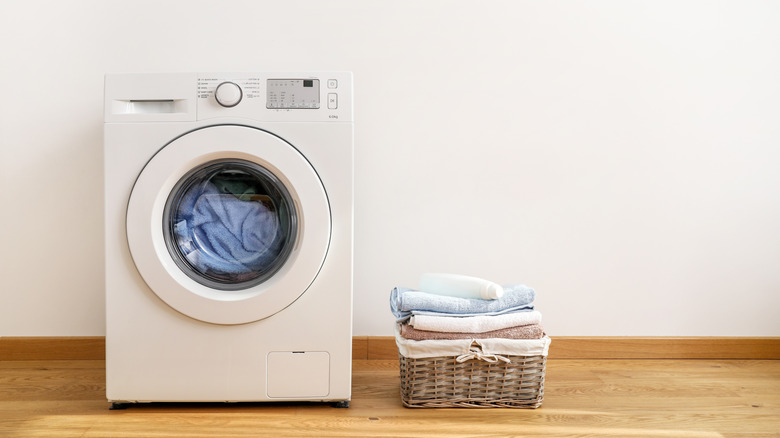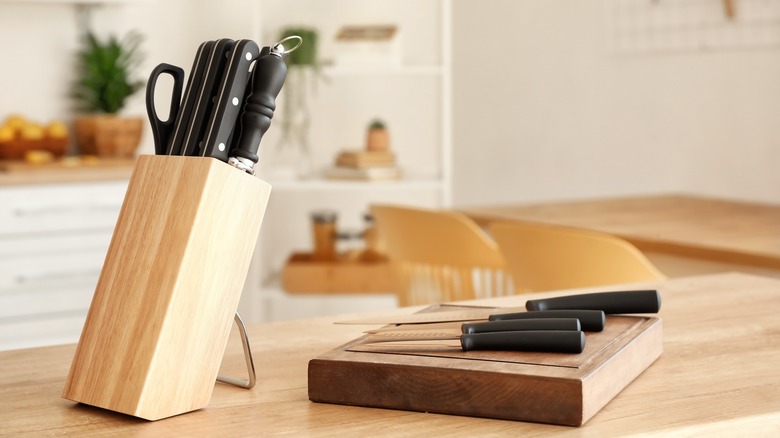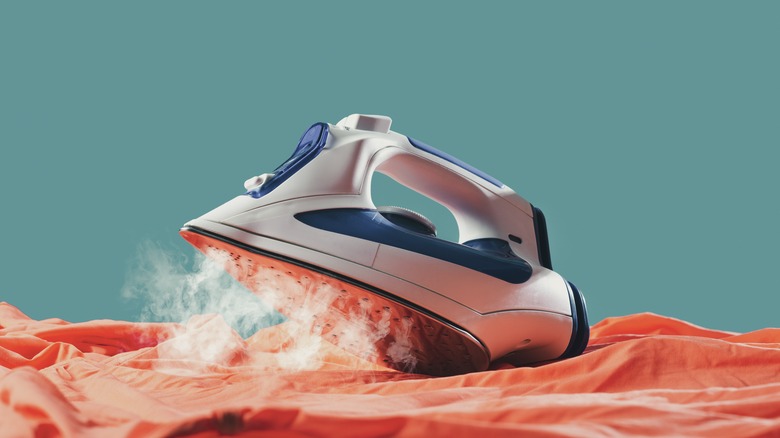5 Things In Your Home You Should Never Clean With Vinegar
Harsh, toxic cleaning products may become a thing of the past as more consumers than ever before are making a conscious effort to stick to natural, safe, and environmentally friendly options. A recent study found that 53% of surveyed Americans say they have switched to using environmentally friendly cleaning products in the past year, while 77% say they are likely to make the switch from traditional cleaning products (per Business Wire).
According to Medical News Today, traditional household cleaners can be hazardous to your health, as long-term exposure to some of the chemicals found in many cleaning products can cause serious illness, trigger asthma, and even cause chemical burns if they come into contact with your skin. Harsh cleaning products can be particularly dangerous for young children and pets since they tend to explore the world with their mouths. Babies (fur and otherwise) run the risk of accidentally ingesting toxic chemicals if they decide to give the cleaner you are using a taste while you aren't looking.
Vinegar has been touted as somewhat of a miracle cleaning agent in recent years as more and more people are making the switch to natural and environmentally friendly cleaning products. Not only is it food-grade, making it non-toxic and safe, but according to Healthline, its powerful acidity makes it a great cleaning agent to destroy grease and grime, and even kill bacteria.
Vinegar can be used in countless places in your home, but there are five places you should skip using it altogether.
Granite countertops
Granite countertops are one of the focal points in every luxurious kitchen, and if you are lucky enough to have this natural stone in your own kitchen, then you know how important it is to take care of it. While granite countertops are popular due to the natural elegance and beauty they can bring to any kitchen, they are also favored for their durability.
As durable and high-end as granite countertops tend to be, Arch City Granite and Marble, Inc. calls acidic substances like vinegar granite's "kryptonite" — noting that the chemical reaction that takes place when vinegar comes into contact with your granite countertops can diminish its shine and ruin the beautiful (and expensive) natural stone.
According to Rock Solid Custom Granite, vinegar can still damage your granite countertops even if it is highly diluted with water, so it's best just to stay away from using it altogether. Instead, stick with something a lot more mild and gentle. Arch City Granite and Marble, Inc. says a mixture of warm water and a little bit of dish soap on a soft cloth will do the trick.
Washing machine
It's a common misconception that home appliances like dishwashers and washing machines that are designed to clean other things also clean themselves when they cycle.
According to Appliance Rescue Service, grimy residue from detergent, stagnant water, and hard water buildup can all accumulate over time and start to grow mildew inside various parts of your washing machine.
Because vinegar is useful in so many other areas of the home, it's only natural for your initial reaction to be to reach for the bottle of vinegar. However, exposure to the acidity of vinegar, over time and done repeatedly, can severely damage the rubber hoses and seals that are found in most washing machines, which can actually cause them to leak (per The Portable Laundry). To be clear, just using vinegar once won't do this, so using it as a very occasional mildew solution isn't the worst idea, but you don't want to make a habit of it. While many people add vinegar to their laundry cycle to act as a fabric softener — some argue that it can be useful in fighting stains and odors on clothing — it's probably best to avoid using it as much as possible, given the risks it poses to the rubber.
Kitchen knives
According to Vos Knife, most good quality kitchen knives are made with iron, making them particularly susceptible to rust and damage if they are exposed to too much moisture. And while prolonged exposure to moisture of any kind can damage your kitchen knife set, exposure to moisture in the form of vinegar can be especially damaging.
The high acidity of white vinegar that makes it so effective at cleaning other areas of your home can seriously corrode the metal knife blade and dull its sharp edge over time. Cooktop Cove adds that vinegar can leave the sharp edge of the knife pitted, leading to you potentially having to replace your knife set altogether (and a shiny, new set of kitchen blades won't be cheap).
Instead of reaching for the vinegar when cleaning your kitchen knives, Cooktop Cove recommends sticking with regular dish soap and warm water — and don't forget to promptly dry them immediately afterward.
Clothing iron
While running a small amount of vinegar through your clothing iron might seem like an easy and convenient way to clean and disinfect the inside of the appliance, doing so could actually quietly be ruining the iron, leading you to have to replace it — this would put you in quite the bind when you have to wear a wrinkled shirt to work.
Because mineral deposits from the water inside the reservoir of your iron can build up over time and clog the spraying mechanism, some people suggest filling the reservoir with white vinegar to combat it. However, by running vinegar through the inside of your iron, you risk corroding the material thanks to the acidity of the vinegar.
Carolyn Forte, director of the Good Housekeeping Cleaning lab, explains further: "Vinegar can damage the internal parts of an iron, so don't pour it through to freshen and clean it out" (via Good Housekeeping). Instead, she recommends emptying your iron's water reservoir after each use to ensure that it is kept clean and clog-free. If you want to prevent mineral buildup inside your iron altogether, Tip Hero suggests simply switching to distilled water instead of tap water.
Hardwood floors
Home Made Simple says vinegar is the absolute worst thing you can use to clean your hardwood floors, as the acidity of the vinegar can seriously dull the polyurethane's shiny finish and damage it beyond repair. Long story short, cleaning a whole house of hardwood floors with vinegar can be a costly mistake.
Even when diluted with water, your hardwood floors still aren't safe from the acidity of the vinegar. Not to mention, Bona says that using vinegar diluted with water to clean your floors isn't a good option anyways as too much water left on the wood can lead to discoloration and cause it to swell over time. Instead, Bona recommends using a floor cleaner that is specially formulated for use on hardwood floors — preferably one with a neutral pH, as this will be gentler on the wood.
Though white vinegar might seem like an obvious way to clean the dirt and grime that gets tracked through the house, it's best to stick to more traditional cleaning solutions if you want to maintain the natural beauty and longevity of your hardwood floor.
